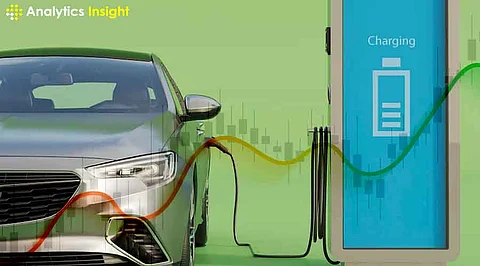

The electric vehicle (EV) market is growing at an increased pace, covering majorly Asian-Pacific regions, with the primary reason being its government support and assistance and the desire for technological improvements. Lower charging durations with its fast charge capabilities, longer travel range, and almost 60% lesser costs compared to petrol vehicles are some of the major benefits included.
Governments worldwide are implementing certain policies to promote EV sanctions, considering all its benefits and also taking into account the global climate changes. Among these, major continents, including North America and Europe, are experiencing significant changes.
Advancements in EV technologies, such as autonomous driving, connected car technologies, and a lot of other features, stand as the major pillars for its increased popularity in the EV market.
The growth and expansion of charging facilities and infrastructure will be crucial factors for the growth of EVs in the Indian market. Hence, investors have anticipated the growth in the EV market from other traditional vehicles.
Tesla, Inc. is a notable and high-valued player in the EV industry, known for its creative technology and its focus on a greener future.
TSLA has been known for its high volatility, making it a hot choice among investors. As of March 6, 2025, the company’s stock is currently trading at US$279.10, reflecting a 2.60% rise with a market capitalization of US$942.6B. There is a substantial market for its products due to the global shift towards EVs that is expected to continue.
Tesla is currently working on affordable EVs, and it could potentially earn US$24.20 per share by 2029. The company is set to deliver approximately 2.07 million units by the end of 2025, representing a 16% increase compared to 2024 figures.
Rivian Automotive, Inc. (RIVN) is an American EV manufacturer that has earned remarkable attention in the stock market. Rivian’s stock has experienced volatility, as is common with growth-oriented EV companies.
As of March 6, 2025, the company’s stock is currently trading at US$11.42, showing a slight rise of 1.42% with a market capitalization of US$11.49B. Despite short-term volatility, Rivian will be an impressive EV stock in the coming years. Share prices are up almost 40% from their all-time low in April 2024.
RIVN is working on building electric vehicles, including R1T pickup trucks, R1S SUVs, and commercial vans, and it could potentially earn US$127.00 per share in 2029. Rivian is set to deliver between 46,000 and 51,000 EVs by the end of 2025, which is a decline from 2024.
Lucid Group Inc. is an EV manufacturer that focuses on technology and range. They develop their own proprietary EV technology, including battery systems.
As of March 6, 2025, the company’s stock is currently trading at US$2.17, with a rise of 3.33% and a market capitalization of US$6.32. The primary focus of the company lies in increasing the production of Lucid Air (a luxury electric sedan made by Lucid Motors).
Over the next few years, Lucid is projected to increase, with prices potentially reaching US$3.05 per share by 2029. LCID shall deliver approximately 20,000 vehicles by the end of 2025, which aligns with the company’s strategy.
Tata Motors, a renowned Indian EV producer, produces models such as the Nexon EV, Tiago EV, Tigor EV, and Punch EV. The company is committed to sustainability and aims to achieve net-zero emissions by 2040.
As of March 6, 2025, the company’s stock is currently trading at ₹638.90 with a slight dip of 0.29% and a market capitalization of ₹2.36T. Tata Motors has its major focus on the development and expansion of its EV portfolio.
At the beginning of 2029, the Tata Motors share price target could be around ₹1,934.50. Tata promises to sell 79,344 vehicles, including EVs, which is a decline from February 2024.
Bajaj Auto Limited is making significant strides in the EV sector, with a focus on both two-wheelers and three-wheelers. Bajaj is well known for its Chetak e-scooter, as it marks its entry into the two-wheeler market. Bajaj is a major player in the three-wheeler market and is focusing on extending their EV manufacturing.
As of March 6, 2025, the company’s stock is currently trading at ₹7,452.00 with a slight rise of 0.10% and a market capitalization of ₹2.08T. Bajaj’s economic growth, inflation, and consumer spending patterns influence their demand, and hence, they are investing more in EV technology and infrastructure. According to the analysts, the minimum price of Bajaj Auto shares in 2029 could be ₹8,000, and the maximum price could be ₹8,650.
Electric vehicles (EVs), when compared to petrol and diesel vehicles, are very cost-efficient and help in reducing air pollution and climate change.
The future of the country for EVs seems promising, but there will still be some challenges to overcome. The EV market in India is growing substantially, and the government is also being supportive since the future of transportation can be seen.
The government is implementing policies to adopt EV technology. Hence, EV stocks in India can be a favorable investment opportunity as all the automotive sectors are paying attention towards sustainability and advancement in technology. EV stocks are gaining gravity in the NSE.
Investors who prefer to aim and align their portfolio based on future trends and support the green revolution can find EV stocks as long-term financial gains. Though considering all the pros and cons, investors will have to carefully assess the possible challenges and risks in the EV industry.
